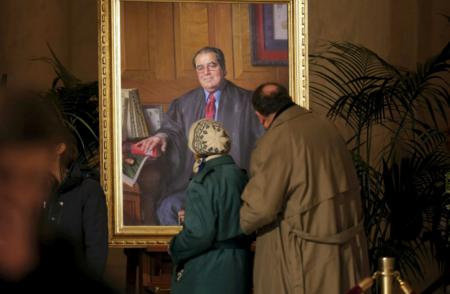The soul of a sinner
Those who saw the funeral Mass for Supreme Court Justice Antonin Scalia two weeks ago saw our Church in all its glory and all its sadness. Like Midnight Mass from Rome and the funeral of Pope John Paul II, the sheer grandeur of our Church was on full display to the world. So, too, the funeral Mass for Judge Scalia.
His funeral followed his taste in the rule of the law: originalist and textualist. The event was thankfully covered with dignity and minimal commentary by all three networks. Very quickly, the entire liturgy appeared on YouTube and went viral. The venue was our beautiful, stone gray and cavernous National Shrine of the Immaculate Conception. The organ pumped, voices rang, pallbearers looked to each other for direction. A sea of white-vest priests, perhaps one hundred concelebrants, filed up to the altar.
The main celebrant was the justice's son, Father Paul Scalia. After reading the Gospel, he began his homily, "We are gathered here because of one man. A man known personally to many of us, known only by reputation to even more. A man loved by many, scorned by others. A man known for great controversy and great compassion. That man of course is Jesus of Nazareth. It is he who we proclaim." At that point the audience realized that this was not to be one of the modern "celebrate-a-distinguished-life" homilies, but a reminder that a funeral Mass is a prayer for the soul of a sinner.
He went on, "He was a practicing Catholic, 'practicing' in the sense that he hadn't perfected it yet. Or rather, Christ was not yet perfected in him. And only those in whom Christ is brought to perfection can enter heaven. We are here, then, to lend our prayers to that perfecting, to that final work of God's grace, in freeing Dad from every encumbrance of sin."
Father Paul then went on to quote his father's advice to a friend that "Even when the deceased was an admirable person, indeed especially when the deceased was an admirable person, praise for his virtues can cause us to forget that we are praying for and giving thanks for God's inexplicable mercy to a sinner."
The sermon ended with a searing reminder of what a funeral Mass is all about. "The true meaning of life is in the journey to death." And, "We are here then, as he would want, to pray for God's inexplicable mercy to a sinner. To this sinner, Antonin Scalia. Let us not show him a false love and allow our admiration to deprive him of our prayers. We continue to show affection for him and do good for him by praying for him: That all stain of sin be washed away, that all wounds be healed, that he be purified of all that is not Christ. That he rest in peace."
At the end of Mass the chorus bust forth with "Oh God Our Help in Ages Past," "Panis Angelicus" and "O God Beyond All Praising." The long line of robed priests left the shrine with white vestments fluttering in the wind like so many angel wings. A sinner sent home.
Yes, Antonin Scalia was a sinner, like all of us. But he was, also, an extraordinary man. An extraordinary Catholic man. He knew and loved Catholic doctrine. He understood and cherished Catholic social thought. While a sinner, he struggled to be a saint.
There are many quiet stories of this fact. One comes from our son-in-law, who observed him all alone after a weekday Mass at St. Mary's Church in downtown Washington, D.C. Finally, he got up to leave and was walking out, when he was approached by woman who had been attending the same service.
She was one of those poor souls one sees in big city churches. Her face and hands had raw sores. She was clearly a troubled woman. Clearly, the kind that most of us try to slip by and avoid. The judge did not. He took her hand and as she spoke with him she began to cry. He did not try to escape. Instead, he held his face next to her, gripping her back with his hand, and listened. The encounter lasted a full five minutes. He just stayed there with conviction. And love. No cameras. No on-lookers, other than our son-in-law.
Finally she finished and pulled away, ready to go. But he continued to hold her sore-filled hand and said some final, and apparently consoling, word to her. He then reached in his wallet for some bills he pressed on her. She left and, after a pause, Antonin Scalia left the church to walk across the green toward the Supreme Court of the United States for an afternoon of work.
Another day in the life of a sinner. Pray for him. Pray for us.
- Kevin and Marilyn Ryan, editors of "Why I'm Still a Catholic," worship at St. Lawrence Church in Brookline, Mass.



















